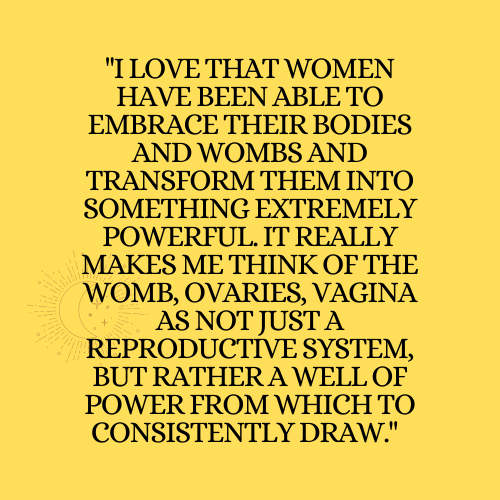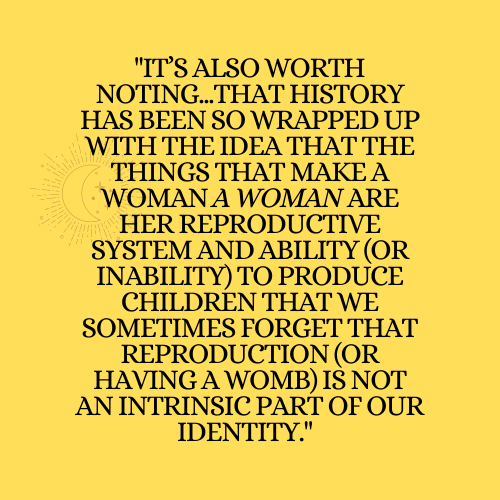The Problem with Reproduction as Identity
Since writing my last blog post in the “Let’s Talk About Sex(ual Agency)” series—which focused upon my choice to switch from combination birth control pills to natural birth control methods—I’ve found myself thinking quite a lot about reproduction and identity.
More specifically, I’ve been thinking about reproduction as identity. What I mean by this is that, due to the fact that women were historically and socially constructed primarily as mothers, caregivers, and life-givers, we’re oftentimes still under the impression that the ability to reproduce is an intrinsic part of every woman’s identity: she is a woman because she can carry a child in her womb. I mean, just take a look at any Victorian novel ever written. All you’ll see are representations of women as mothers or nurturing figures who are condemned to the domestic sphere.
I’m overexaggerating, yes, but not by that much.
This idea that women are inherently tied to motherhood is obviously problematic not only because it reduces women down to their reproductive systems but because it also insinuates that a woman is not really a woman unless she can, in fact, carry a child in her womb. This brings about an important question: what should we do with this part of our social and historic identity?
The Practice of Womb Worship or Womb Culture
I’ve seen countless women—particularly on Instagram—who built their entire careers around caring for and nurturing other women’s wombs: they hold rituals that revolve around the menstrual and lunar cycles, they provide tips for easing pain during menstruation, they offer advice on how to care for a fetus while in the womb, and they talk extensively about the womb as a source of energy.
In other words, these women talk almost explicitly about the power of the womb and why it is important that we embrace such power: a power that is closely linked to bearing children and motherhood.
Now, this is a little bit different than those representations of women in Victorian novels I mentioned earlier primarily because it is a sort of reclamation of reproductive and feminine power. I tend to think of it as womb worship or womb culture (and perhaps there already are individuals who are calling it this).
And—honestly—I’m all for it.

I love that women have been able to embrace their bodies and wombs and transform them into something extremely powerful. It really makes me think of the womb, ovaries, vagina as not just a reproductive system, but rather a well of power from which to consistently draw.
However, upon first glance at womb worship or womb culture, there appears to be an obvious issue: what about the women—and individuals who identify as women—who don’t have a womb, ovaries, or vagina? Or women who cannot or choose not to reproduce?
Can Everyone Participate in Womb Worship or Womb Culture?
I’m thinking about the women who have had hysterectomies, women struggling with endometriosis, individuals who transitioned to women at different points in their lives, as well as the women who might have trouble conceiving children or choose not to conceive children. In this regard, I think the fact that some women have really embraced womb worship or womb culture as part of their identity can be construed as problematic because it tends to exclude a lot of women.
Upon conducting a bit more research regarding what I’ve been referring to as womb worship or womb culture throughout this blog post, though, I’ve actually found that it’s not as exclusive as it initially appears. From my understanding, the womb is simply a representation of feminine power, connection, creation, love, compassion. The womb acts as an energetic space, not necessarily a physical entity. Therefore, an individual does not have to physically have a womb, or even have a good relationship with their physical womb, in order to participate in womb worship or womb culture.
Indeed, many wombs require healing and nurturing, which is perhaps why we’re seeing such growth in the development of womb worship or womb culture nowadays.

It’s also worth noting, however, that history has been so wrapped up with the idea that the things that make a woman a woman are her reproductive system and ability (or inability) to produce children that we sometimes forget that reproduction (or having a womb) is not an intrinsic part of our identity.
In other words, a woman may choose to make womb worship or womb culture a large part of her identity, but it should be just that: a choice.